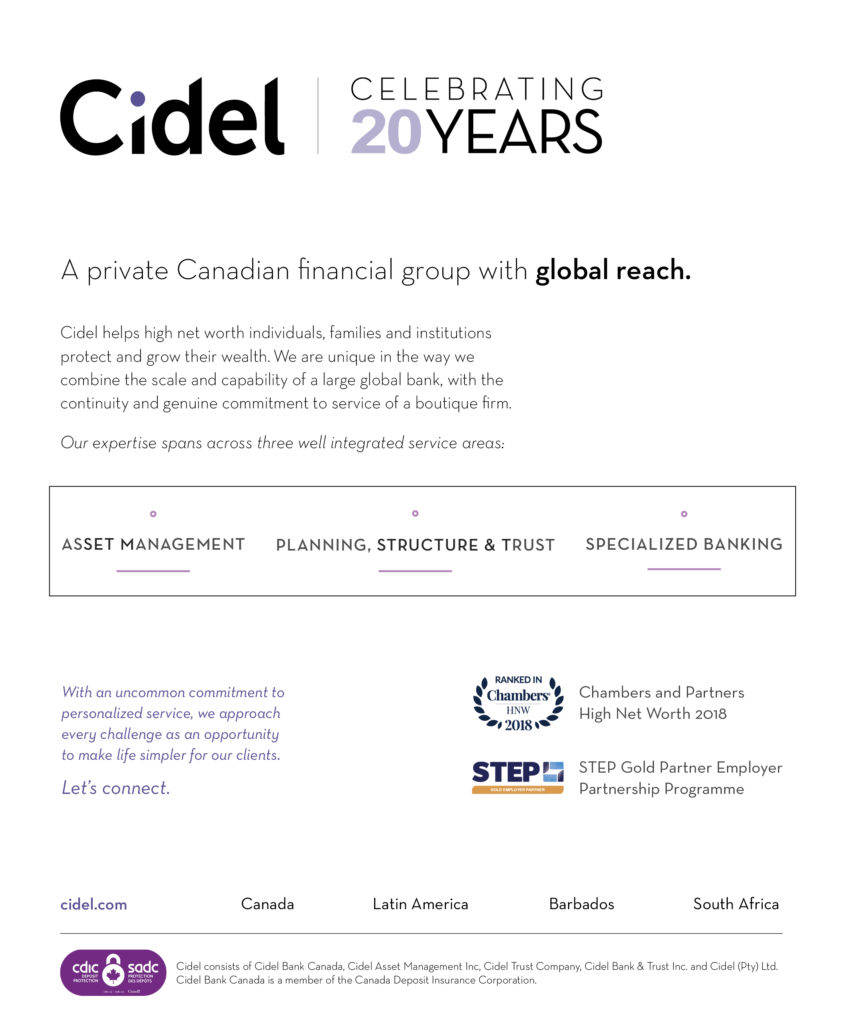December 2020
Our own Catherine Jackman and Christy DeCosimo spoke at the virtual Foundation, Endowment & Not For Profit Investment Summit on December 3, 2020.
This event highlighted the use of effective investment strategy to mitigate risks, achieve better portfolio performance and meet a not-for-profit organization’s stated mandate.
Our team gave an enlightening presentation on corporations, society and the shifting dynamics.
November 2020
The holiday spirit begins at Cidel Bank & Trust Barbados with a donation of $25,000 along with 40 tablets to children in need.
The donation was made recently at the Salvation Army’s Reed Street headquarters. It is part of the Bank’s ongoing outreach efforts to assist schools and vulnerable groups within the surrounding area of its Collymore Rock location.
Some students either had no access to online classrooms or had to use their parents’ cellphones to access online classes – a situation that was not tenable.
Cidel is proud to say our donation will not only help with the current learning situation but also for further years of education in Barbados.
Read the full article here.
Last week we hosted our Annual Investment Discussion.
Our event ended with a panel of Cidel experts who discussed the key factors, risks and the impact of the election as well as COVID-19.
Click Here to watch the 20 minute discussion.
Cidel has sponsored CPA Alberta‘s Annual Forum that covers industry news.
We are proud to promote an event that is about looking forward and exploring the possibilities.
Click Here for more information.
Our Q3 2020 Quarterly Report is out!
This report covers topics including Cidel’s performance summary, a podcast on ESG, award nomination outcomes and more. Enjoy!
October 2020
Cidel continues to look for client centric solutions and the partnership with ERI and its OLYMPIC Banking System which started in 2016 has allowed Cidel to continue to be a major player in the UHNW space.
The implementation of the OLYMPIC Banking System achieved a number of positive outcomes:
- Cidel eliminated 3 existing systems resulting in a significant annual cost savings both in license costs and IT support.
- The system enabled client relationship managers to focus on building client relationships instead of building reports. This helped Cidel grow its AUM even during the initial stages of the implementation
- Reduced the amount of time spent on regulatory reporting required by OSFI, OSC, SEC, FACTCA, AML.
- Increased the accuracy and timeliness of performance reporting, including attribution analysis, to clients
- Allowed flexibility in reporting through the use of a data warehouse instead of using pre-programmed stock reports.
- Enabled the implementation of a new client facing website eliminating the need to use a third party vendor.
- Allowed STP trading and settlement at multiple custodians in multiple jurisdictions. Trading staff were able to focus on trading instead of trade settlement.
- Introduced enhanced security features to align user access with securities legislation requirements.
- Integrated the bank functions into the wealth management operations allowing clients to quickly access loan facilities
- Decreased the amount of time that auditors spent during Cidel’s annual audit.
Our committed partnership with ERI implementing our OLYMPIC Banking System has led to this huge success for both companies. The solution has already been chosen by more than 300 financial institutions and banks worldwide. ERI with more than 30 years of expertise, also won the Best Banking System category for 2019 at the Systems in the City Financial Technology Awards (London, United Kingdom), out of 10,000 votes from across the industry and a total of 121 nominated companies.
As an example of the efficiencies obtained from using the new system, Cidel Asset Management has processed, for a single client, over 77,000 individual trades and settled the trades with multiple custodians. This entire operation was done without a single error or a failed trade. The error free implementation & strong investment performance gave the client confidence to increase his allocation to us in the succeeding months.
Cidel Bank Canada has over 175 employees in its offices in Canada and abroad and oversees over $14 billion of client assets.
Click to read the OLYMPIC Banking System Press Release.
During October, Cidel was joined by leaders in the Not-for-Profit (NFP) community for a virtual session on governance.
Our guest speaker, Don McCreesh, a Not-for-Profit (NFP) governance expert, was hosted by Cidel’s Christy DeCosimo and Catherine Jackman.
Many NFP organizations have faced increased stakeholder concern with governance policies and fundraising during the pandemic. Governance is more key than ever.
For Cidel it was a wonderful opportunity to celebrate the great work that these organizations do across Canada and elsewhere. It is a privilege for us to be involved with those who work so hard to build stronger communities which is near and dear to our firm culture.
Cidel is proud to contribute to worthy causes and even more proud of our staff who use their own time to volunteer. Whether it is coaching hockey, serving meals at shelters or working on boards – we should all celebrate the great accomplishments and critical role NFPs play.
A big thank you to Don, to our attendees and to all the volunteers and staff at NFPs who are so dedicated to their missions.
Click here for the presentation.
September 2020
Are you aware Canada has been ranked SECOND in Soundness of Banks by the World Economic Forum?
We have the same value as Finland at the top spot!
See the full ranking of countries.
August 2020
Our Q2 2020 Quarterly Report is out!
This report covers topics including Cidel’s performance summary, non-profit organizations, award nominations and more. Enjoy!
July 2020
Our Barbados office sprang into action this month to help 250 vulnerable households.
Thousands of Barbadians have been impacted by widespread job loss due to COVID-19. Cidel Bank & Trust’s humanitarian project ballooned into a major partnership with the Lions Clubs of Barbados.
It was a matched donation and the substantial funds raised through the staff project was matched by Cidel Bank & Trust. This donation allowed for the purchase of essential food items, fresh fruits and vegetables, as well as personal care products for entire families. A special component of the initiative included the distribution of 12 electronic tablets for students in affected homes who required the devices to continue their education online.
Families were selected using the Lions Clubs’ registry of persons in need. Cidel employees were also asked to identify affected households whose main breadwinners had been laid-off during the national shutdown or worked in sectors that remain closed due to the halt in tourism and international travel. All of this was possible based on the help of Shonda Forde, a long-standing member of the Lions Club.
For Carol-Ann Smith, President of the Cidel Staff and Activities Committee, it was a satisfying moment as she joined other employees and Lions Club members preparing over 250 care packages. She added: “COVID-19 has shown us just how fortunate we are. We had great participation from all our staff and we are really pleased with the outcome.”
Ryle Weeks – President of Cidel Bank and Trust commented that“This is one of our biggest projects to date and we wanted, as a company to give back to our communities and demonstrate our commitment to this country. We are fortunate as a company because none of our employees have been impacted by jobs cuts. Our staff are still employed full-time and at full pay and we believe it was incumbent on us to share with others during this difficult time.”
View the full news story here.
We are honoured to receive, for a third year, the Chambers and Partners High Net Worth Award.
Cidel is considered by 2020 sources to be a “big player in the private client space.” One commentator describes it as “one of the best available in Canada,” while another highlights that “they have some good people working there and they are a go-to for investment and trust services.”
In an interview one person had this to say:
“They are my favourite, they stand out absolutely,” an interviewee enthuses; “I love to refer clients there, they give the best personal service and they provide help to clients all the way through. They are so responsive and thoughtful. They truly stand out to me, they are a leader for banking and trusts.”
We feel very proud of our achievements and will continue to provide great services to our clients.
Click here to read more.
June 2020
We have been a proud sponsor of the YWCA Toronto Women of Distinction Awards for the past 3 years and as an event that raises a substantial amount of funds for the organization, we were saddened to learn that, due to this difficult and unprecedented time, it had to be postponed. To help the organization meet the huge shortfall, Cidel, along with other event sponsors, moved forward with their sponsorships, as a 2020 donation to YWCA Toronto.
YWCA Toronto’s mission remains to provide safe and supportive spaces for the most vulnerable women and girls in Toronto. The programs that would have directly benefitted from the funds raised still need support, and the added threat of COVID-19 has increased the need.
Please consider joining Cidel in the support of YWCA Toronto and Click Here if you are able to do so.
We are pleased to announce that our team has been nominated for The SIACharts Inc. Award for Digital Innovator of the Year.
The awards process includes an industry-wide call for nominations, research, finalist submissions, and winner selection by a judging panel comprising independent experts in the wealth management and financial advice industries.
We are incredibly excited to be recognized among the top in our industry by the Wealth Professional Awards. This event has been running 6 years and is the leading independent awards event for the wealth management industry.
April 2020
Our Q1 2020 Quarterly Report is out! This report covers topics including Cidel’s equity strategy, pension plans, non-profit organizations and more. Enjoy!
March 2020
Click Here to read a message from our Chief Investment Officer.
Click Here to read a message from our Chief Investment Officer.
February 2020
Cidel’s Q4 2019 Quarterly Report is out! This report covers topics including impeachment, Japanification, non-profit organizations and more.
Enjoy!
December 2019
The Founder’s Awards are given to members who have made ‘an exceptional and outstanding long term contribution to the Society above and beyond that normally expected of a member through office in his or her branch or elsewhere in the voluntary life of the Society’.
Congratulations Amanda Lashley for being a recipient of the 2019 STEP Founder’s Awards!
Speaking at the Canadian Investment Review’s 2019 Defined Benefit Investment Forum in Toronto on Dec. 6, Charles Lannon, head of equities atCidel Asset Management Inc., discussed whether Europe and the United States are destined for a similar fate as Japan.
Click here to read:
Over the past few weeks, Cidel has hosted several events where Charles Lannon, Cidel’s Head of Equity Research shared Lessons From Japan.
He addressed whether or not there are learnings for the rest of the world from Japan’s decades of slow growth and very low interest rates.
Click here to read:
November 2019
Cidel Asset Management has been appointed to manage Canadian equities for a leading Canadian financial institution. We are excited to partner with ATB Wealth, the wealth management arm of ATB Financial, as sub advisor to their innovative investment platform.
ATB Financial is an Alberta-built financial institution that serves more than 750,000 Albertans from over 300 locations. Cidel looks forward to a successful partnership.

October 2019
Our Q3 2019 Quarterly Report it out with highlights on ESG Ratings and Fixed Income Strategies.
July 2019
Our Q2 2019 Quarterly Report is out and highlights Cidel Executor Services and Multi-Asset Class Strategies.
June 2019
We are delighted to announce that Cidel Asset Management has been named a finalist for the award of Investment Team of the Year for the 2019/20 STEP Private Client Awards to be held in London U.K. on September 25th, 2019.

Cidel was invited to participate in the conference “Inbound Investing into Mexico – Implications of USMCA, Tariffs and Other Trade Barriers”.
Armando Ramos, Senior Wealth Consultant and Director was part of the panel that discussed the implications and opportunities of the USMCA Treaty. Armando talked about the investment opportunities that Canada offers to Mexican HNW individuals and families as well as the good environment for investing in Canadian private equity funds.
The event was organized by ACG Toronto. ACG is the premier association for driving middle-market growth in the Private Equity and M& A industry
May 2019
Cidel is proud to celebrate its 20th anniversary this year!
We continue to forge ahead with an uncommon commitment to personalized service by approaching every challenge as an opportunity to make life simpler for our clients.
Cidel was pleased to host our annual women’s event over lunch last Thursday for clients and investment professionals at The Hazelton Hotel.
The panel discussion was on mental health and social media, with a focus on the effect of technology on children and adolescents. Our panel featured Dr. Ian Chen, Adolescent Medicine Specialist.

The Chair of STEP Worldwide, Simon Morgan congratulated Cidel Bank and Trust, Vice President Amanda Lashley, who has been elected as a committee member of Business Families Global SIG Steering Committee.
Amanda has been a STEP member since 2003 and is actively involved in the Barbados STEP Branch where she chaired from 2014-2017. She is also a member of the STEP Caribbean Steering Committee and Chaired the 2018 STEP Caribbean conference which was held in Barbados.
The Business Families SIG (Special Interest Group) provides a community for practitioners, who work with business families and a platform for education, training, continued professional development and the expansion of field networks and support. The group focusses on what makes business families distinct, their particular challenges, and how best to address these. The group aims to marshal expertise, promote best practice and champion the practice area.
This STEP worldwide appointment and is a big honour and validation of Amanda’s hard work and expertise.
It has been said the world can be united through music and sport. Squash certainly proves that true as one of the great international sports. Cidel has supported squash in Barbados through advertising, volunteer time and active participation over the past 12 years.
Pictured here is Paul Mcleod, Cidel’s CFO ready to play a match in the International Masters Squash tournament being held at the Barbados Squash club. The 13th year of the tournament has been its largest ever with players travelling from Canada, Untied States, England, Germany, Denmark, Norway, Scotland, Trinidad, Bermuda and BVI to play and enjoy Barbados. 135 players from 8 different countries.

Q1 Quarterly Report is out. Hope you enjoy!
February 2019
On February 4th, at the Sandals Royal resort in Barbados the Prime Minister and Minister of Finance and Investment, Mia Amor Mottley addressed the dignitaries, friends and staff in honour of our 20th anniversary. Adrian Meyer – Deputy Chairman of Cidel Bank and Trust Inc, spoke of the history of Cidel and Craig Rimer Chief Executive Officer brought greetings from Canada and thanked everyone for their contribution to the success of the business.
Our Q4 Quarterly Report is out. Hope you enjoy!
January 2019
Cidel was proud to continue our support for CFA Society Calgary as sponsor of the Forecaster of the Year at the 42nd Annual Forecast Dinner. It was a good evening hearing from Willis Sparks of Eurasia Group, Paul Smith, CFA, President & CEO of the CFA Institute, and our panelists: Jackie Forrest, Todd Hirsch and Larry Berman.

Great exposure for Cidel!
We are one of the sponsors of the Foundations & Endowment Investment conference taking place in Toronto on January 30th – 31st 2019.
Environmental, Social, and Governance (ESG) information has received increased attention from investors in recent years. As of 2017, 75% of major companies around the world produced some form of Corporate Social Responsibility (CSR) report, up from 19% in 2002.
In these articles Cidel Asset Management explores the Rise of ESG disclosures and takes a closer look at why Corporate Governance matters.
To read more Click Here
December 2018
Click Here to read a message from the Chief Investment Officer to our clients.
Cidel’s investment research and portfolio management team travels the world to learn more about firms and industries and to interview senior management.
Philip Young is presently travelling in Asia and has sent along some insights.
To read more about Philip’s travels Click Here
November 2018
Cidel discusses market implications of potential presidential impeachment!
At Cidel, analyzing the risks to … While we view the potential impeachment of President Trump as unlikely at this time, the odds may have marginally increased and we are monitoring factors that could change our view….The likelihood of the President being impeached remains low. but the odds of it becoming a political discussion point are higher with the results of the recent mid-term election. The Republicans did retain their majority in the Senate, but no longer hold the largest number of seats in Congress.
Our Q3 Quarterly Report is out. Hope you enjoy!
September 2018
Cidel is awarded STEP Gold Employer Partner status
We are proud to announce that Cidel was named a Gold Employer Partner of the STEP Employer Partnership Programme in Canada, South Africa and Barbados!
STEP is the global professional association for practitioners who specialise in family inheritance and succession planning. STEP works to improve public understanding of the issues families face in this area and promotes education and high professional standards among its members. Full STEP members, known as TEPs, are internationally recognised as experts in their field, with proven qualifications and experience.
Achieving Gold accreditation is a testament to the strength of policies, practices and structures that Cidel has implemented to support its growing Private Wealth offering.
Speaking about the accreditation, Amanda J. Lashley, Vice President, Trust & Legal Cidel Bank & Trust Inc. said,
“Cidel Bank & Trust Inc., has enjoyed a long-standing relationship with STEP and is honoured to have achieved gold accreditation with the Employer Partnership Programme. This solidifies Cidel’s commitment to developing its key resource; its people.
“In our pursuit to encourage continuing education and ensure that we as a company strive to provide the highest professional standards within our trust, corporate and investment team, we firmly believe that being affiliated with an organization such as STEP is demonstrative of our commitment to academic and professional excellence. This will ensure that we stay current and are equipped to service our clients globally.”
Jenni Hutchinson, Head of Employer Partnerships for STEP, said “Cidel is to be commended on the way that it supports its staff by means of the very good learning and development provision it has in place. This, backed by a supportive, strong leadership and positive learning culture, ensures that all staff are given the encouragement that they need to achieve their potential”.
Cidel’s Karl Berger, Senior Wealth Consultant and Director was a guest at BNN Bloomberg discussing his thoughts on the case for investing in Canadian stocks for the long haul. In this BNN interview, Karl states a strong argument can be made for staying in Canadian stocks.
August 2018
Our Quarterly Report is out – Looking back at Q2 and moving forward into Q3, with the impact of tariffs, yield curves and forward earnings. Hope you enjoy!
July 2018
We are proud to announce that Cidel was named one of six “Recommended Private Banks-Canada” in the High Net Worth 2018 Guide issued by Chambers and Partners. Cidel was the only privately-owned bank that was recognized; the other ranked firms are the private banking units of Canada’s 5 largest financial institutions.
According to the guide, Cidel “is very strong on the investment management side, has a trust business and offices in Toronto and Calgary”, and “They do client services like no one else on the street. They have expertise at a level no one else in the city has. They know what they’re doing”.
Chambers and Partners’ annual High Net Worth Guide is specifically aimed at the international private wealth market, and covers private wealth management work and related specialisms, like private banking, in key jurisdictions around the world.
Cidel is an international private bank focusing on Asset Management, Planning, Structuring and Trust, and Specialized Banking. Cidel combines the scale of a large global bank with the continuity and genuine commitment to service of a boutique firm.
June 2018
Cidel is pleased to congratulate our Chairman Mr. Geoffrey Matus who received an honorary degree from the University of Toronto, June 20th, 2018 for his exceptional work in the education and health care industries. In conferring this degree he was recognized for all his efforts and impact that he has had on all those that have worked with him. Congratulations Geoff, from all at Cidel for this significant and well-deserved honour recognizing your relentless and tireless efforts for the betterment of others.
April 2018
Arthur Heinmaa, Chief Executive Officer of Cidel Asset Management joins industry experts in commenting on currency and how it impacts institutional investors.
Click here to read the article that explores exchange rates at a time of uncertainty around everything from trade deals to monetary policies.
March 2018
February 2018
Cidel’s Quarterly Report is out – a look back at 2017 and our investment team’s key themes for 2018.
November 2017
Cidel’s Senior Vice President, Portfolio Manager and Head of Global Equities Mandate Charles Lannon was a presenter at this year’s national conference of the Portfolio Management Association Canada. In this BNN interview from the conference, he discusses how to find value in global equities. Click here to watch.
Our Q3 Investment Report is out – Looking Back on Q3, Looking Forward at Q4, and spotlights on active vs. passive and global infrastructure.
October 2017
Karl Berger, Cidel Senior Wealth Consultant and Director, was guest host on BNN’s ‘The Street’ last week. In this clip he discusses the Federal Reserve and expected upcoming changes.
An inspiring piece on the Invictus Games plus spotlights on distressed investing, cancer research and why you should question widely held investment maxims.
Click Here: http://cidel.com/newsletters/august-2017/




